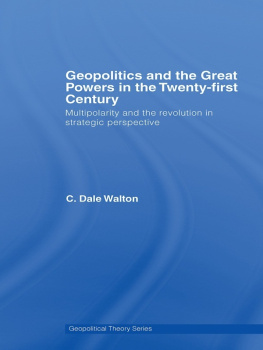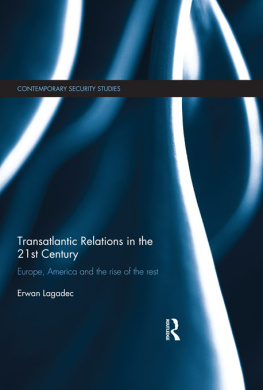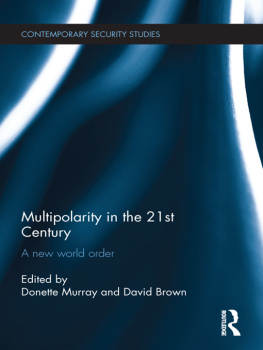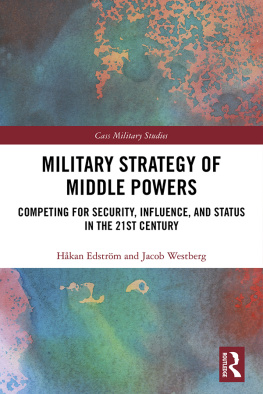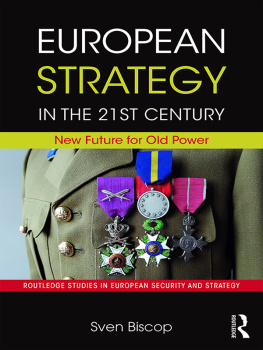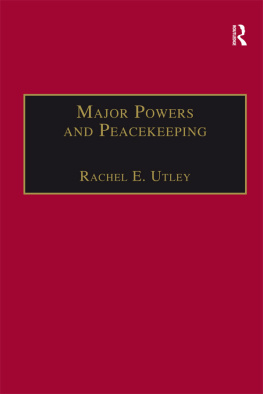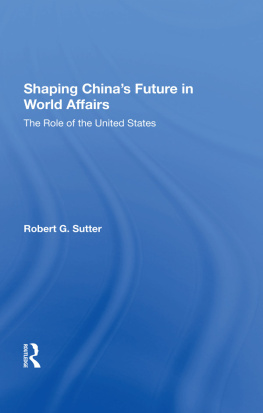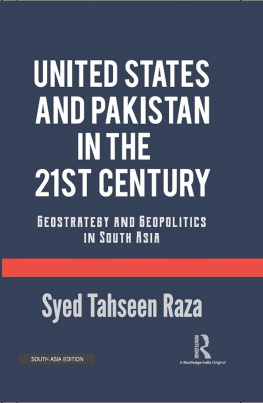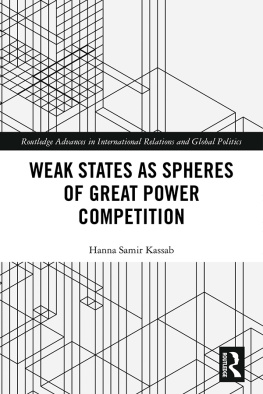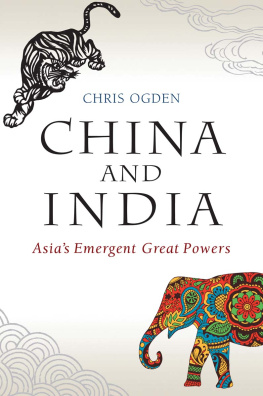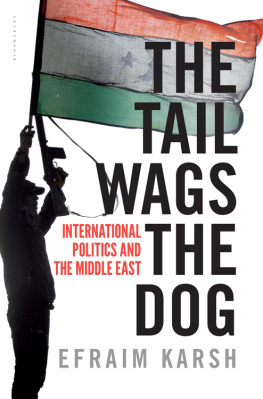Geopolitics and the Great Powers in the Twenty-first Century
This book argues that in the twenty-first century Eastern Eurasia will replace Europe as the theater of decision in international affairs, and that this new geographic and cultural context will have a strong influence on the future of world affairs.
For half a millennium, the great powers have practised what might be called world politics, yet during that time Europe, and small portions of the Near East and North Africa strategically vital to Europe, were the centers of gravity in international politics. This book argues that the unipolar moment of the post-Cold War era will not be replaced by a USChina Cold War, but rather by a long period of multipolarity in the twenty-first century. Examining the policy goals and possible militarypolitical strategies of several powers, this study explains how Washington may play a key role in Eastern Eurasian affairs if it can learn to operate in a very different political context.
This book also considers the rapid pace of technological change and how it will impact on great power politics. Considering India, China, the United States, Russia, Japan, and other countries as part of a multipolar system, this book addresses the central questions that will drive US policy in the coming decades.
This book will be of great interest to students of international security, military history, geopolitics, and international relations.
C. Dale Walton is Lecturer in the Department of Politics and International Relations at the University of Reading (UK) and managing editor of the journal Comparative Strategy.
Geopolitical theory series
General editors: Geoffrey Sloan and Mackubbin Owens
1 Global Geostrategy
Mackinder and the defence of the West
Edited by Brian Blouet
2 Geopolitics, Strategy and the Transformation of Civilisations
Leonard Hochberg
3 Geopolitics and the Great Powers in the Twenty-first Century
Multipolarity and the revolution in strategic perspective
C. Dale Walton
First published 2007
by Routledge
2 Park Square, Milton Park, Abingdon, Oxon OX14 4RN
Simultaneously published in the USA and Canada
by Routledge
270 Madison Ave, New York, NY 10016
Routledge is an imprint of the Taylor & Francis Group, an informa business
This edition published in the Taylor & Francis e-Library, 2007.
To purchase your own copy of this or any of Taylor & Francis or Routledges collection of thousands of eBooks please go to www.eBookstore.tandf.co.uk.
2007 C. Dale Walton
All rights reserved. No part of this book may be reprinted or reproduced or utilized in any form or by any electronic, mechanical, or other means, now known or hereafter invented, including photocopying and recording, or in any information storage or retrieval system, without permission in writing from the publishers.
British Library Cataloguing in Publication Data
A catalogue record for this book is available from the British Library
Library of Congress Cataloging in Publication Data
A catalog record for this book has been requested
ISBN 0-203-00473-6 Master e-book ISBN
ISBN10: 0-415-35853-1 (hbk)
ISBN10: 0-203-00473-6 (ebk)
ISBN13: 978-0-415-35853-8 (hbk)
ISBN13: 978-0-203-00473-9 (ebk)
For Amy,
My unrelated little sister
Acknowledgements
A multitude of friends and colleagues have contributed to this work, but Colin S. Gray deserves special mention for the enormous contribution that he has made to my education in matters geopolitical over the years. In addition, J.D. Crouch and Bill Rood contributed much to my perspective on geopolitics, as did many of the students in the postgraduate geopolitics course I taught at Missouri State University. I would also like to thank the numerous friends and fellow academics who have enlightened me on various issues, particularly Steve Cimbala, Chris Harmon, Tom Kane, James Kiras, Peter Pham, John Sheldon, Steve Rosefielde, Larry Serewicz, and Brad Thayer. Also, I thank Bill Van Cleave, a friend, mentor, and my longtime department head, for his support and encouragement over the years. He has contributed enormously not only to my own intellectual and career development, but to those of a seemingly-endless number of other academics and policymakers
Able research support was provided to me by several highly capable assistants: Caleb Bartley, Sage McLaughlin, Jackie Moseley, Steve Peterson, and Dave Walgreen. I also would thank Andrew Humphrys, my editor at Routledge, for his support throughout the publication process, as well as Geoff Sloan, who is both an editor of this series and a colleague at the University of Reading. Claire Dunstan has my thanks for her help in the editing, typesetting, and printing of the book. My kind-hearted wife, Shelley, not only accepted the annoyances intrinsic to being an authors spouse, but also contributed her skills as a proofreader.
As always, any errors solely are my own.
Introduction
New powers and old politics
The chief purpose of this work is to argue that the world political system is presently undergoing a fundamental transformation. This change has two distinct, but related, aspects: the end of the era that the great geopolitician Halford Mackinder termed the Columbian Epoch to a Post-Columbian Epoch and the shifting of the geographical center of gravity in international politics from Europe to an area referred to herein as Eastern Eurasia. This book explores the broad implications for world politics of these tectonic changes, with particular attention to how the United States might cope with them and maintain its position as the preeminent power in the world despite the passing of its ephemeral unipolar moment.
In a paper presented to the Royal Geographical Society in 1904, Mackinder argued that the era of exploration, which he termed the Columbian Epoch, was ending, and that the world was becoming a closed political system. At the same time, he warned, technology (particularly the development of intricate rail networks) was again making it possible for the Heartland the core of Eurasia, the place from which, in previous centuries, wave after wave of nomadic invaders threatened the European Rimland to menace the seapowers of Western Europe. In short, Mackinder believed that a long era was coming to an end, and that a new age, filled with peril, was being born.
This author contends that Mackinder was largely correct in his broad analysis, even if he was mistaken in certain specifics, and that his warning about the passing of the Columbian Epoch provides a good starting point for a geopolitical analysis of how world politics will likely develop in coming decades.
Mackinder and the Cold War
In retrospect, one might argue that there were two small but significant flaws in the analysis that led Mackinder to believe that the Columbian Epoch was imminently coming to an end, and that it would likely be followed by a period of Heartland supremacy over the European seapowers. First, he perhaps underestimated the capability of a mighty offshore seapower the United States to protect the declining European seapowers from the Heartland power. However, the history of the mid-twentieth century demonstrates just how close Mackinders fears came to being fulfilled.
Nazi Germany made a very serious, and quite nearly successful, attempt to unseat the Soviet Union as the Heartland tenant and make itself the master of Europe from the English Channel to the Urals. This vast superpower would have commanded the majority of the worlds industrial production, a very sizable chunk of its manpower, and all the natural resources necessary eventually to establish itself as the hegemon of the entire planet. Berlin failed catastrophically in this enterprise, and as a result the Red Army was able to flow out of the Heartland fortress and fill the power vacuum created in EastCentral Europe by the destruction of Germany and exhaustion of France and Britain. As it consolidated its control over its new colonial possessions, Moscow kept its economy on a war footing and appeared poised to expand westward. The United States, however, effectively chose to abandon permanently its usual isolation from Continental politics and act as the protector of those European countries that had not yet been absorbed into the Soviet imperium. The result, of course, was the Cold War, and the United States successfully held Moscow at bay until the Soviet Union expired and the bulk of the Heartland was inherited by a reborn, but relatively weak, Russia.

